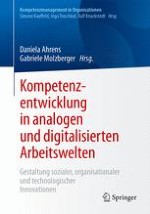2018 | OriginalPaper | Buchkapitel
7. StaySmart-Ansatz zum kollaborativen Kompetenzaufbau, -erhalt und -austausch
verfasst von : Jan Marco Leimeister, Sofia Schöbel, Katja Lehmann, Sarah Oeste-Reiß, Matthias Söllner
Erschienen in: Kompetenzentwicklung in analogen und digitalisierten Arbeitswelten
Verlag: Springer Berlin Heidelberg
Aktivieren Sie unsere intelligente Suche, um passende Fachinhalte oder Patente zu finden.
Wählen Sie Textabschnitte aus um mit Künstlicher Intelligenz passenden Patente zu finden. powered by
Markieren Sie Textabschnitte, um KI-gestützt weitere passende Inhalte zu finden. powered by
